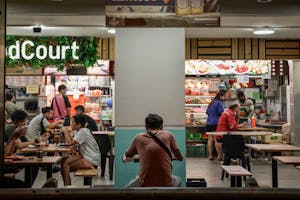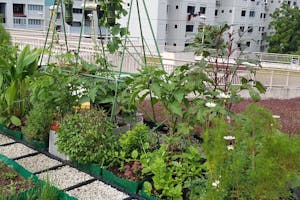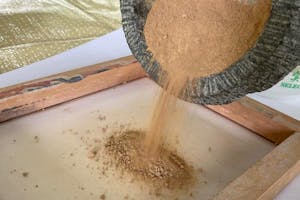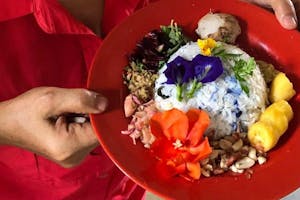Here: One Lockdown Away
I smell a smell that has become familiar to me. It is fetid—acrid smoke rises from the pan—its propagator aptly having a name with four letters. Foul to some, yet fervently used by others. While some call it The Devil’s Dung, it will be the base for lunch. Different coloured lentils stew over the stove; I pick out the gases it leaves behind that if not would turn into farts. The mountains gleam through my kitchen’s greased-up windows. I am surrounded by the tallest peaks in the world. More than gleam, the mountains radiate. It is a rare thing to be able to see them this time of year. But the imposed lockdown has brought the clearest, bluest skies in decades. The sun comes in strong bursts through the monsoon clouds, just earlier roaring, as though being born for the first time. Under the shine, slices of white radish that will turn brown and flavourful pickle away. A cast-pan of greens fry, potatoes bubble waiting for spice, rice steam away in an iron pot. Is this the smell of home?
While lunch sorts itself out, I sort out my pantry. Potatoes, cabbages, beans, a couple of gourds. There has been less to choose from these days. This year’s especially heavy monsoon has drowned crops and brought pests to eat what remained. Evenmore, like an ominous scene from the bible, the locusts came. All heads turned to the sky when the swarm flew in unhindered by the pandemic we were all under. A moment where one was not sure if one should gawk or if one should awe, or if one should perhaps do both. One, two, three, twenty-three, four-hundred-and-twenty, four-hundred-and-twenty-one… counting them was impossible. The swarm seemed to make the lost, usual, grey, and heady haze come back. Nature is a sight indeed, both in ultimate forms of beauty and ugliness, whether of creation or tragedy. Heads turned back to the ground when they left, looking further down than where their toes lay, not knowing what would happen next.
The lockdown has brought different ways. Farmers harvest unripely, anxious to make sales. Villagers whose yearly income and families depend on seasonal foraging are unable to do their jobs. Prices are hiked. Fruits are limited. Many vegetables are unavailable. Cheaper-priced produce now come from a country two borders down, sprayed with fresheners to make the journey. If not, arrive with a cloud of enveloping mould. Home-grown vegetables have become the best option. Sellers come by pushing their carts, making their rounds around the neighbourhood in the wee hours of the morning before the blares of authorities arrive. We must vacate before the sun rises. It is during such that sometimes rules must be broken in order to survive. Neighbourhood grocery shops close their front doors openly but open their back doors closely, providing some much needed provisions during this time; their highest sales are packed instant food, beer, and long cigarette rolling papers. An empty stomach is more worrisome than clogged up lungs, hunger being one of the hardest thing a living thing should ever endure. At this moment, my partner walks through the door with today’s slaughter. A young adolescent brings the load fresh to the butcher every morning and evening, trudging from the local slaughterhouse with his bicycle and the daily carcasses. Today we have lung, intestine, parts of spine, parts we cannot decipher, thick pieces of hide, and an eyeball. The butcher’s wife says we must keep the better, meatier cuts for humans to eat. There has been less slaughters, she had explained, next to the lad huffing by his worn-out vehicle. Nonetheless, our dogs will be happy. Here, my companions lay. Where am I? I must be home.
In the middle of the main road that rings the capital, a red chariot 13-men-tall, carrying the giver of rain, sits silently. The only sound coming is the sound of rain falling on rotting wood. But just shortly before, the chariot was being pulled by 800 men, all in protest, screaming slurs in between hips of hoorahs, violently parading down, fighting for the right to celebrate tradition. They had been waiting to conduct their yearly procession since the beginning of the lockdown. In the end, the crowd was hushed with tear gas and water cannons. The God of Rain was not blessed. As tears rushed down the faces of all parties that day, one wondered, will more crops join what has already been drowned?
The night of the full moon is looming. The next festival will arrive shortly. It will be 10-days-long, starting when the moon is still half-asleep, and ending when she is in full bloom. It is a celebration for the victory of good over evil, marking the day when their goddess defeated the demons. It starts with a grand platter. A conglomeration of grilled buffalo meat marinated with a very generous amount of green and red chillies, a large variety of spices, and then still further spiced by dunking in mustard oil; dried and fried fish; rice, flattened and puffed; roasted black soybeans; different types of lentil patties, some fried with mince, some with egg, some served as is; spiced potatoes; eggs, boiled then fried; fresh and dried fruits; fresh garlic and ginger; several types of bread, sweet and savoury; and lastly, not forgetting, moonshine distilled from different rice, grains, and millets. The meal symbolises luck, fortune, and wealth. It would be a long awaited meal for it was only on festive days as such that anyone could have one—the same feast that they offer to their Gods, with the only exception being that a platter for a God is just as the mountain ranges they sit in, tall majestic, with each peak topped with a smoked fish, whole. Today, normally, a human-portioned meal is readily available at many local eateries.
This feast, however, is not all that is offered. On the eighth day of the ten days— with its people celebrating eating copious amounts of meat throughout— it is the Goddess’ turn to be fed. A blood-thirsty manifestation of her will arrive. Thousands of buffaloes, goats, hens, and ducks must be beheaded to feed her. I was here at the same time last year. I saw animals come and carcasses leaving. Piled one on top of the other, all missing heads, pulled away in a wagon by just a young boy, leaving the city’s stray dogs to lick up what was left. The air was thick with blood. The streets were stained red for weeks after. But this year, what will happen if an angry, hungry goddess is not fed? A quote intrusively resounds: Hell hath no fury like a woman scorned. This year, will the mountains of offerings come? The mountains that corner every crook of every of the many narrow alleyways that make the veins of the city; will they appear? Will blood flow down the paths of the valley? This lunar year, will the Gods be fed?
Around this time, a festival of my roots also draws closer. I should be labouring in the kitchen, pounding with my pestle, freshly roasted peanuts for its oil. Syrup will be simmering, the lye is ready. I omit the egg wash for my daughter’s allergies but I do not miss out the element of ornament that they must have; they are still traditionally hand-shaped in animals of different sorts. I place them ready to eat in her lunchbox, together with her lantern, ready for her to bring to school. She will show them off to her friends, homemade animals of the moon, a benefit of having allergies and a mother around. During this lockdown, I reminiscence. I miss the flavour of lotus and winter melon. I miss the meaning of a golden egg. I miss the reunions of families. I miss flying to the moon. I have been living on and off the road for almost six years, moving between paradises in slums and slums in paradises. Now, I am here, 4,986 kilometres away from what was home, stuck in a lockdown, sitting at 1,400 metres high, yet—I am home.
With the length of the lockdown, I have seen the seasons change from warm to cold, and then back to warmish again. It should be warmer, as it was last year, but the weather has been dampened by the prolonged monsoon. We have yet to have a sunny week here. And it has begun to get colder again. Coming from the equator, seasons bewilder me. Plants I have never seen flower before bloom underneath my feet. Fruits of different colours and climates come and go, short-lived and cherished. People come out later when it is cold. I hear yawns softly ringing down my alley. Children start school later; laughter is delayed. Veggie and meat vendors open their shops later too, when the slowing sun has finally reached theirs. The dogs come around, basking in the treasured sunlight while it it out. In the summer, tea shops are open before dawn, ready to serve their regular customers already there. Even the cake shop is open for business. People here like their sweets for breakfast. My favourite breakfast spot, serving deep-fried, poofed bread, will already be flocked with my neighbours from around, all ready with empty bags to take some back home for their families. In fall, the time around now, the Mid-Autumn Festival finally makes sense. Today, I am blessed with a sunny day wedged in between rainfall; I appropriately say my prayers for a good harvest this year.
As I watch children fly kites from the rooftops instead of carrying lit lanterns down the streets, I wonder how the meanings of things have change. Though I think of celebrating this year with a samay baji instead of a goehpia, are things really so different? I am fed, I am warm, I am with family. Whether home is here or home is back—I am fed, I am warm, I am with family. Must it matter that a golden egg means nothing here? I watch the kites try to bite each other down. They brace the arriving festival, kite-flying being an important part of it; they are asking the Gods to stop sending rain. As the big day closes in, even more kites will come. Maybe, soon, the sun will come to stay.
This article was published under the open call Food in the time of Covid. We asked people to send in stories that explore dimensions of food and life under a period of uncertainty and lockdown in 2020. Learn more about it here.
About the author
lost.kucing_ is a cat with no and many homes. With a jade-and-white rabbit and two black-and-white dogs, she lives (though always temporal) on a little street aptly named Old Freak Street. They wait patiently to reunite with the rest of the furry family, so that they may fly back to the moon all together, and finally have the welcome-home cheese-party that they have been impatiently awaiting.
Share this article
Dig Around

Could our Food Culture Solve the Climate Crisis?

Interview with Ong Chun Yeow, attempts at food-growing in Singapore

Gathering For and With Soil

Nasi Ulam and NS on National Day
Contact Us
Drop us an email or DM on Instagram if you would like to give us feedback, support us in any way, or just to connect!
Foodscape Collective
Foodscape Collective is a ground-up community with a mission to co-create a fair and inclusive circular food system for all. We work together to create communities and livelihoods through collaborative and supportive practices.
Copyright (C) 2025 - Foodscape Pages. All Rights Reserved